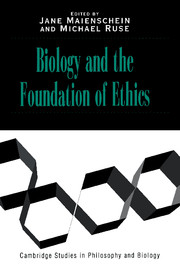Book contents
- Frontmatter
- Contents
- Introduction
- 1 Aristotle on the Biological Roots of Virtue: The Natural History of Natural Virtue
- 2 The Moral Status of Animals in Eighteenth-Century British Philosophy
- 3 From Natural Law to Evolutionary Ethics in Enlightenment French Natural History
- 4 French Evolutionary Ethics during the Third Republic: Jean de Lanessan
- 5 The State and Nature of Unity and Freedom: German Romantic Biology and Ethics
- 6 Darwin's Romantic Biology: The Foundation of His Evolutionary Ethics
- 7 Nietzsche and Darwin
- 8 Evolutionary Ethics in the Twentieth Century: Julian Sorell Huxley and George Gaylord Simpson
- 9 The Laws of Inheritance and the Rules of Morality: Early Geneticists on Evolution and Ethics
- 10 Scientific Responsibility and Political Context: The Case of Genetics under the Swastika
- 11 The Case against Evolutionary Ethics Today
- 12 Biology and Value Theory
- Notes on Contributors
- Index
3 - From Natural Law to Evolutionary Ethics in Enlightenment French Natural History
Published online by Cambridge University Press: 06 July 2010
- Frontmatter
- Contents
- Introduction
- 1 Aristotle on the Biological Roots of Virtue: The Natural History of Natural Virtue
- 2 The Moral Status of Animals in Eighteenth-Century British Philosophy
- 3 From Natural Law to Evolutionary Ethics in Enlightenment French Natural History
- 4 French Evolutionary Ethics during the Third Republic: Jean de Lanessan
- 5 The State and Nature of Unity and Freedom: German Romantic Biology and Ethics
- 6 Darwin's Romantic Biology: The Foundation of His Evolutionary Ethics
- 7 Nietzsche and Darwin
- 8 Evolutionary Ethics in the Twentieth Century: Julian Sorell Huxley and George Gaylord Simpson
- 9 The Laws of Inheritance and the Rules of Morality: Early Geneticists on Evolution and Ethics
- 10 Scientific Responsibility and Political Context: The Case of Genetics under the Swastika
- 11 The Case against Evolutionary Ethics Today
- 12 Biology and Value Theory
- Notes on Contributors
- Index
Summary
The relationship between ethics and biology within the French Enlightenment tradition can only loosely be associated with the Darwinian meaning of “evolutionary ethics.” There was no notion of “evolution” in our modern sense until the writings of Jean-Baptiste Lamarck (1744–1826) in 1800, nor was there a unified understanding of how moral reasoning relates to the biological constitution of human beings. As a feature of the general Enlightenment philosophical project, one must consider individual ethical vignettes united in a family resemblance of relations. The unity of these diverse developments can best be characterized as efforts to supplant the authority of revealed religion and tradition by naturalistic foundations for morality, society, and economic order. Reflections on the “biological” foundation for ethical action provide a component of this more general enterprise.
Darwin's connections of ethics and evolutionary biology, developed primarily in chapter five of the Descent of Man (1871), associate him with the eighteenth-century Scottish moral-sense tradition of David Hume, Adam Smith, Dugald Stewart, and especially James Mackintosh (Manier 1977, pp. 96–101). Nonetheless, indirect connections from Darwin to French traditions can be specified. His membership in the student Plinian Society during his medical studies in Edinburgh (1825–7) led him into contact with Robert Edmond Grant, the foremost advocate of Lamarckianism in the British Isles. That may have acquainted him with the contemporary French discussions of transformist ethics.
- Type
- Chapter
- Information
- Biology and the Foundations of Ethics , pp. 52 - 83Publisher: Cambridge University PressPrint publication year: 1999
- 3
- Cited by



